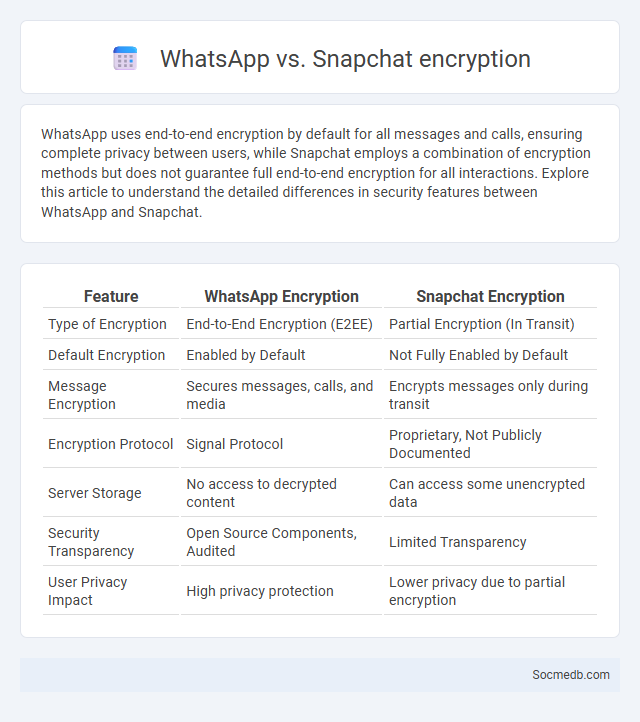
Photo illustration: WhatsApp vs Snapchat encryption
WhatsApp uses end-to-end encryption by default for all messages and calls, ensuring complete privacy between users, while Snapchat employs a combination of encryption methods but does not guarantee full end-to-end encryption for all interactions. Explore this article to understand the detailed differences in security features between WhatsApp and Snapchat.
Table of Comparison
| Feature | WhatsApp Encryption | Snapchat Encryption |
|---|---|---|
| Type of Encryption | End-to-End Encryption (E2EE) | Partial Encryption (In Transit) |
| Default Encryption | Enabled by Default | Not Fully Enabled by Default |
| Message Encryption | Secures messages, calls, and media | Encrypts messages only during transit |
| Encryption Protocol | Signal Protocol | Proprietary, Not Publicly Documented |
| Server Storage | No access to decrypted content | Can access some unencrypted data |
| Security Transparency | Open Source Components, Audited | Limited Transparency |
| User Privacy Impact | High privacy protection | Lower privacy due to partial encryption |
Introduction to Messaging App Encryption
Messaging app encryption secures your conversations by converting messages into coded formats only accessible to intended recipients, preventing unauthorized access. End-to-end encryption protocols, such as those used in WhatsApp and Signal, ensure that neither service providers nor hackers can read your communications. Protecting your privacy through advanced cryptographic algorithms has become essential in today's social media landscape.
Understanding End-to-End Encryption
End-to-end encryption (E2EE) ensures that only the communicating users can read the messages, preventing third parties, including service providers, from accessing the data. Platforms like WhatsApp and Signal implement E2EE to secure text messages, voice calls, and video chats by encrypting data on the sender's device and decrypting it only on the recipient's device. E2EE enhances user privacy and data security, making it a critical feature in protecting sensitive communication against cyber threats and unauthorized surveillance on social media.
How WhatsApp Implements Encryption
WhatsApp employs end-to-end encryption to secure all messages, calls, photos, and videos exchanged on its platform, ensuring only you and the recipient can read or listen to the content. This encryption uses the Signal Protocol, which generates unique encryption keys for every message, preventing unauthorized access even by WhatsApp itself. Your privacy remains protected through continuous updates and strong cryptographic standards embedded within WhatsApp's infrastructure.
Snapchat’s Encryption Approach
Snapchat employs end-to-end encryption to safeguard your messages, ensuring that only you and the recipient can access the content. This encryption approach prevents third parties, including Snapchat itself, from intercepting or reading your private communications. By prioritizing strong encryption protocols, Snapchat enhances user privacy and security on its social media platform.
Key Differences: WhatsApp vs Snapchat Encryption
WhatsApp uses end-to-end encryption by default for all messages, calls, and media, ensuring only you and the recipient can access the content, while Snapchat employs encryption mainly during message transmission but stores snaps on servers briefly before deletion. WhatsApp's encryption protocol is based on the Signal Protocol, known for strong security and privacy, whereas Snapchat focuses more on ephemeral message delivery with limited encryption. Your choice between the two should consider WhatsApp's robust privacy for ongoing conversations versus Snapchat's design for temporary sharing and less persistent data storage.
Strengths and Limitations of End-to-End Encryption
End-to-end encryption ensures your social media messages remain private by preventing unauthorized access during transmission, enhancing security against hackers and eavesdroppers. This encryption method strengthens confidentiality and trust but may limit content moderation and law enforcement capabilities, potentially allowing harmful or illegal content to go unchecked. Understanding these strengths and limitations is essential for balancing privacy with safety on your social platforms.
User Privacy: WhatsApp vs Snapchat
WhatsApp employs end-to-end encryption by default, ensuring messages and calls remain private between users, while Snapchat offers ephemeral messaging with self-destructing content but lacks comprehensive encryption for all communication types. Both platforms collect user data for targeted advertising, yet Snapchat is known for extensive metadata collection and user activity tracking compared to WhatsApp, which limits data sharing due to its encryption protocols. Privacy-conscious users often prefer WhatsApp for secure messaging, whereas Snapchat appeals to those valuing momentary sharing despite higher data exposure risks.
Data Security Risks in Both Platforms
Social media platforms present significant data security risks, including unauthorized access, data breaches, and identity theft. Your personal information can be exploited through phishing attacks, malware, or weak privacy settings, making it essential to use strong passwords and enable two-factor authentication. Understanding these vulnerabilities helps you protect your digital footprint across both popular social networks like Facebook and Instagram.
Future Trends in Messaging App Encryption
Future trends in messaging app encryption emphasize end-to-end security enhancements, leveraging quantum-resistant algorithms to safeguard user data against emerging cyber threats. Developers are increasingly integrating AI-driven encryption protocols that adapt in real-time to evolving attack patterns, ensuring Your communications remain private and secure. This shift highlights the growing importance of zero-trust architectures and decentralized key management in next-generation social media platforms.
Conclusion: Which App Offers Better Encryption?
Signal offers superior encryption with its open-source, end-to-end encryption protocol ensuring maximum privacy for messages and calls. WhatsApp uses the same Signal protocol but collects more metadata, reducing overall privacy. Telegram provides encryption only in secret chats, lacking default end-to-end protection for all communications.
 socmedb.com
socmedb.com